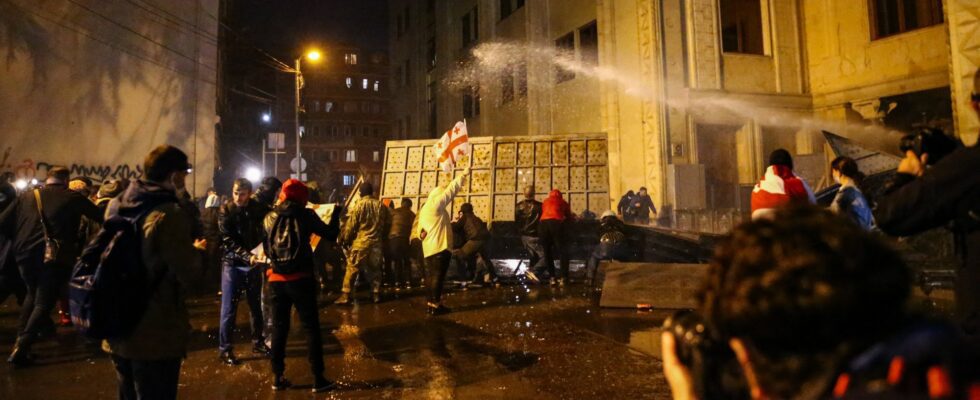The opposition in Georgia on Thursday launched a new call to demonstrate after two days of clashes in this Caucasian country, despite the announcement by the authorities of the withdrawal of a text deemed repressive by its detractors. The Georgian government is accused of wanting to introduce legislation inspired by the Russian model to classify organizations critical of the government as “foreign agents”.
A former Soviet republic in the Caucasus with around four million inhabitants, Georgia has been shaken for years by a political crisis symptomatic of its tug of war between Europe and Russia. Moscow and Tbilisi clashed in 2008 in a short war won by the Russian army. On Wednesday, for the second consecutive evening, tens of thousands of demonstrators gathered in the center of Tbilisi to demand the withdrawal of the text, which provides that NGOs and media receiving more than 20% of their funding from abroad be obliged to register as “foreign agents”, on pain of a fine.
A new event in sight
But on Thursday morning, after an evening that saw police disperse huge crowds outside parliament with tear gas canisters and water cannons, the ruling Georgian Dream party backtracked. “As a party of government responsible to every member of society, we have decided to unconditionally withdraw this bill that we support,” he said in a statement posted on his website.
Several opposition parties, however, announced a new demonstration on Thursday, saying that the mobilization would continue “as long as there is no guarantee that Georgia is firmly committed to a pro-Western path”. They also demanded “the immediate release of dozens of demonstrators who were arrested” during the rallies on Tuesday and Wednesday.
“Strength of the People”
Near Parliament, where calm reigned on Thursday afternoon, the government’s retreat is greeted with a mixture of pride and mistrust. “The government is withdrawing its law because it has seen our determination, the strength of the people,” Chota Kikaleichvili, a 19-year-old student, told AFP. “They are right to be afraid: we are going to remove them from power,” he says, bravely. “We are Europeans, Georgia’s place is in the EU. This government, which is bringing us back into Russia’s orbit, must resign,” said Miranda Djanachia, a 51-year-old museum curator.
Faced with the troubles that agitate this neighboring country, the Kremlin said Thursday “concerned”, while denying any link with the bill on “foreign agents”. “The Kremlin has absolutely nothing to do with it,” said its spokesman Dmitry Peskov, as protesters compared the Georgian plan with the law in force in Russia which is used to suppress opponents, NGOs and the media. The European Union delegation in Georgia welcomed the announcement of the text’s withdrawal, urging the government to “resume pro-European reforms”.
In its press release, the Georgian Dream considers that the draft law has been “presented in a bad light in a misleading way”, adding that it would launch public consultations to “better explain” the purpose of this text.
“Important Moment”
These demonstrations are part of a broader context of political crisis. Tbilisi officially aims to join the EU and NATO, an orientation taken after the “rose revolution” of 2003 which brought to power the pro-Western Mikheïl Saakashvili, now an opponent and imprisoned. But several recent moves by the current government, such as the “foreign agents” bill, have cast doubt on whether pro-Western aspirations will continue, with the opposition accusing it of backing Moscow.
For Thomas de Waal, Caucasus specialist at the Carnegie Europe research center, how Georgia emerges from the current crisis could be decisive for its future. “This is an important moment for Georgia, which is still a democracy, but a struggling democracy,” he said. A sign of growing concern in the West, Brussels condemned the text on Wednesday, deeming it “incompatible” with EU values. Washington, for its part, called for respecting “the freedom of assembly”.
